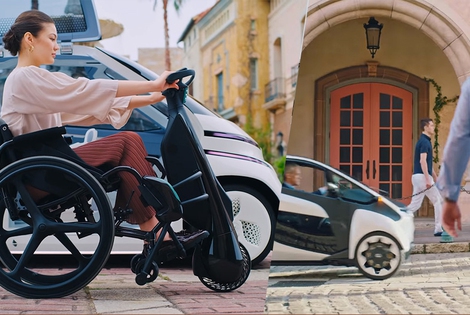
Milan has announced one of Europe’s most ambitious mobility schemes, known as Strade Aperte (open roads). Its goal is to reduce cars in phase 2 of the lockdown by increasing bike lanes and pedestrian areas.
One of the leading manufacturer of electric motors face the crisis and relies on electric mobility, building engines, batteries and bicycle parts itself.
A new brand was born that aims to become the discovery of the year with regard to electric mobility. Indeed, in 2015 a full range of electric vehicles 100 percent made in Italy are being launched. A bike, a scooter and a city car. All with an electric soul.
We are talking about Askoll, one of the world’s largest electric motor manufacturer for appliances, heating and air conditioning. The company, that is headquartered in Povolaro di Vicenza, has also 11 units in Italy, Slovakia, Romania, Brazil, Mexico, China and a total turnover of about 300 million euros in 2014.
“We all own at least 4/5 motors designed and manufactured by Askoll” says president Elio Marioni. This is a company that made its fortune out of innovation. “Since its foundation in 1978, Askoll has been granting 850 patents. Today, we are trying to apply our expertise to electric mobility”.
In a shrinking market where low costs sometimes replace quality, the company takes action by investing € 360,000 in almost 18 months to create a full range of electric vehicles.
It was in such circumstances that eB1, the pedal-assisted bicycle, and eS1, the electric scooter, were born. Designed and manufactured in Vicenza’s factories, these electric means of transport are the real strength of the company. The electric motor, drive unit and battery (powered by Panasonic), are also built in Vicenza’s plants.
The electric bicycle, with its vintage look and a fascinating design, is light, nice and easy to use. The 300 Wh battery is assembled on the front side and is one with the bicycle frame. It can be easily removed, taken home (it weighs around 1.5 kg) and charged in its connector that can be plugged in every home socket. A full charge costs around 5 cents, considering the electricity night rates, and lasts for 100 kilometres.
The eS1 electric scooter was designed by Paul Trabuio, who has been working for 23 years in Aprilia and Piaggio and is the creator of Scarabeo. The two-wheeler was built around the electric motor and battery pack (which lies under the seat), and an ergonomic design. The peculiarity of this model is undoubtedly the regenerative braking: while driving on a straight road you can use it in place of the brakes (only in case you slow down softly), when you bend out it makes your driving experience funnier. Even in this model a full charge lasts for 100 km but it uses 2 kWh of electricity, at a cost that averages 30/50 cents.
But this is not all about Marioni’s idea. “Every month from April onwards we are going to open one Askoll store in a different city of Italy”. In eight Italian cities from north to south there are going to be Askoll’s official stores. Vicenza, Verona, Padua, Catania, Cuneo, Turin, Bergamo, Mantua and at a later time Pisa, Bologna, Milan, Rome, Lucca, Florence and Lecce. In these official stores not only can you buy vehicles, but also the whole line of Askoll’s branded accessories. The price? 990 euros for the bike and 2,190 euros for the motor scooter.
Siamo anche su WhatsApp. Segui il canale ufficiale LifeGate per restare aggiornata, aggiornato sulle ultime notizie e sulle nostre attività.
![]()
Quest'opera è distribuita con Licenza Creative Commons Attribuzione - Non commerciale - Non opere derivate 4.0 Internazionale.
Milan has announced one of Europe’s most ambitious mobility schemes, known as Strade Aperte (open roads). Its goal is to reduce cars in phase 2 of the lockdown by increasing bike lanes and pedestrian areas.
Formula 1, the world’s most important auto racing championship, has decided to turn the page and aim for carbon neutrality with the support of its teams, drivers and the whole racing circus.
Toyota and LifeGate began telling the story of hybrid mobility back in 2006, now, on the road to the Tokyo 2020 Olympics, they’re still treading the path of sustainable mobility. Here are the main steps of the journey.
Germany’s first solar bicycle lane could be the prototype for the roads of the future. The photovoltaic tiles melt snow and ice, and are capable of absorbing noise.
The Vespa is back in an electric version. Production has just started and the first models can be reserved online starting from October.
The city of Utrecht, in the Netherlands, is home to a bridge for cycling and walking that stretches over roof garden of a Montessori school. This project enhances practicality and will allow families to bring children to school by bike, passing through green areas. Despite their functionality, bridges are often seen as an infrastructure that is
The Lego hair bike helmet is the latest Internet craze. For now it’s just a prototype but production on a large scale will probably start soon.
Just as fires often give way to new growth, after the Dieselgate scandal, which saw Volkswagen cheating on US emission rules, the German car manufacturer radically changed course, beginning to focus on sustainable mobility. The German car company aims to propose thirty zero-emission models and produce at least one million battery electric vehicles by 2025. An ambitious mission
Sustainable, two-wheel mobility is triumphing in Copenhagen. After years of investments, policies, and infrastructural changes, bikes now outnumber cars in the city centre. The website Copenhagenize has released data linked to the number of vehicles entering the city centre, which are monitored by the city’s administration on a daily basis. Last year, 265,700 bikes have entered







